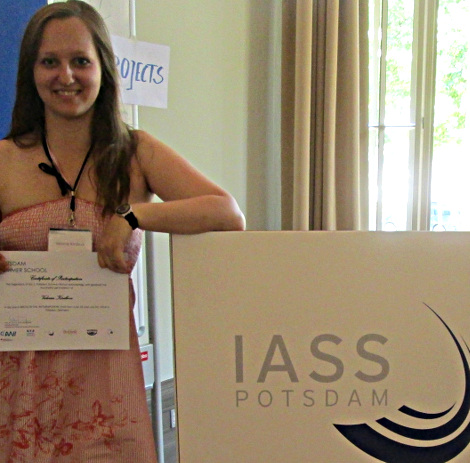Die Inhalte dieser Seite sind leider nicht auf Deutsch verfügbar.
Seitenpfad:
- ArcTrain
- Training reports
- Summer School "Arctic in Anthropocene"
Summer School "Arctic in Anthropocene"
June 23 - July 7, 2014, Potsdam
The first week of the summer school consisted mostly of Natural sciences lectures (Ice sheet dynamics, Permafrost changes, Arctic resources, etc.), followed by discussions between speakers and participants. It was very important that there was always time for discussions which turned out to be exciting, rich and sometimes even provocative. For example there were completely different opinions on the validity of the term “Anthropocene”. Besides that such topics as Law and Governance in the Arctic and environmental risks assessment were covered. Also people from various organizations like Greenpeace, Bundeswehr Planning Office, PRI Principles for Responsible Investment, Ethnological Museum of Berlin were invited to give their own opinion and visions on the Arctic problems.

The second week had another format. It started with science-policy duets which were well organized, were brief enough and comprised clear messages. On Monday, 30.06 there was a public event in the University of Potsdam with keynote lecture “Climate Change in the Polar Regions – a reason to worry?” by Prof. Peter Lemke from AWI Bremerhaven, followed by the panel discussion, participants of which were Prof. Hans-Joachim Kümpel (Bundesanstalt für Geowissenschaften und Rohstoffe (BGR)), Prof. Hans-Wolfgang Hubberten (Alfred-Wegener-Institut, Helmholtz-Zentrum für Polar- und Meeresforschung), Prof. Nele Matz-Lück (Christian-Albrechts-Universität zu Kiel).
From Wednesday to Friday all participants of the Summer school were involved in the Planning process exercise, where each of us had a specific role in an imaginary northern island community (from one of the groups – government,
From Wednesday to Friday all participants of the Summer school were involved in the Planning process exercise, where each of us had a specific role in an imaginary northern island community (from one of the groups – government,
local stakeholders, industry and the scientific advisory group). Therefore everyone had their own goals and resources and principles. My role was a “local food producer”; this made me interested in saving fishing and hunting areas of the island, developing local food business, etc. This exercise was supposed to teach us how to negotiate between groups of people with completely different interests in such processes. For my training I found scientific lectures and especially discussions fulfilling; I met a lot of scientists and got to know their research and interests. Moreover I have more clear impression now about the link between science and policy in the Arctic region. I got to know social and political scientists, met scientific journalist, people from organizations like WWF, people working with Arctic or Antarctic treaties and Laws. I believe that I obtained useful knowledge and expanded my scientific network.
Valeriia Kirillova
Valeriia Kirillova


